Whey vs Egg Protein: Which Is Better for You?
Author:
Unlock your full potential by engaging with our experts and community! Have questions about your fitness journey or looking for expert advice on weightlifting techniques? Don’t hesitate — leave a comment below and Oleksandr Maksymenko will provide a personalized answer and insights to help you reach your goals.
Torokhtiy is reader-supported. Some links are affiliate links, and we may earn a commission at no extra cost to you. See our disclosure page for details.
Wondering what to choose between whey vs egg protein? Before you spend your money, you should know the key differences between these types of protein. Perhaps one of them does not suit you, and the other will be perfect!
Both whey vs egg protein has its own advantages. Whey protein contains more leucine, has a more appealing taste and is perfect for shakes and smoothies. Egg protein is also high quality protein suitable for people with milk allergy or lactose intolerance.
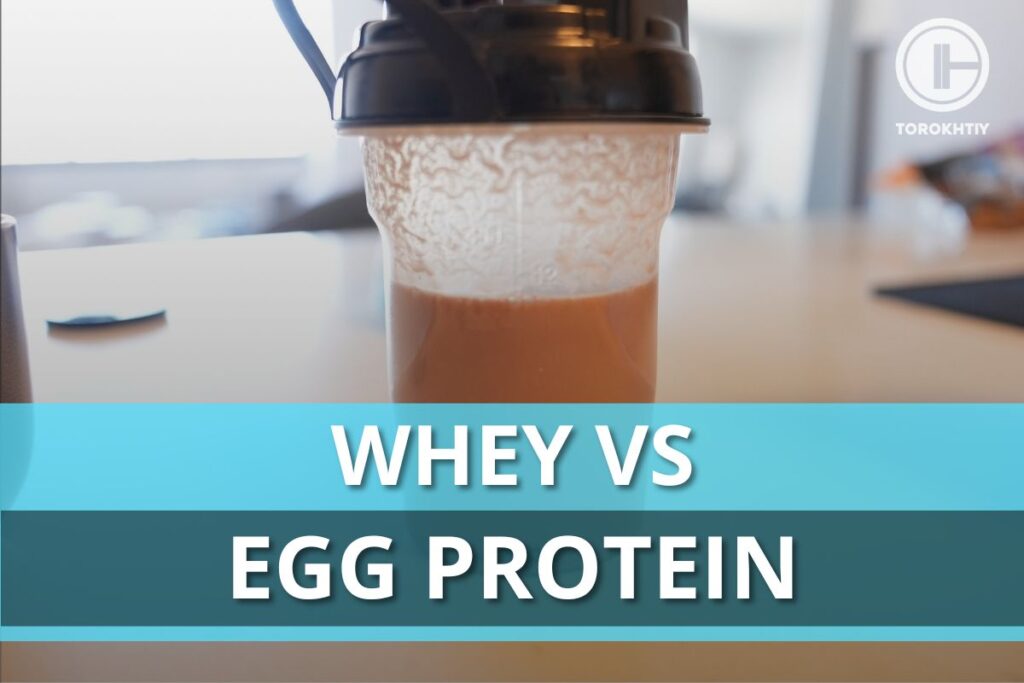
What’s Egg Protein
As the name implies, this is a type of protein, which is found in eggs. Egg protein is known for its great amino acid profile and digestibility, which has been used as the standard for comparing other dietary proteins. In a powder form, egg protein is made from egg whites.
It is a concentrated source of high-quality protein, with a high content of the most anabolic amino acid – leucine.
What’s Whey Protein
This is one of the proteins found in milk. Whey protein also has an excellent amino acid profile and highest concentration of leucine of all other protein sources! Whey protein powder has replaced egg protein powder, which used to be the most popular protein supplement.
Whey vs Egg Protein Detailed Comparison
Let’s take a closer look at the key differences between these two types of protein.
1. Processing
The process of producing egg protein powder is quite simple. The egg whites are separated from the yolks, dehydrated and finely ground to form a powder. Of course, in order for the product to be safe, the egg white is pasteurized. This minimizes the risk of salmonella infection.
As for the whey protein, it is actually a by-product of the cheesemaking process. The milk is tested for quality and pasteurized to kill pathogenic bacteria. Enzymes are added to it, which help separate milk into whey and casein.
As a result, we get a liquid part (whey) and a solid part that resembles cottage cheese. At the next stage, the liquid part is filtered from fats, lactose, some minerals and then dried to a powder form.
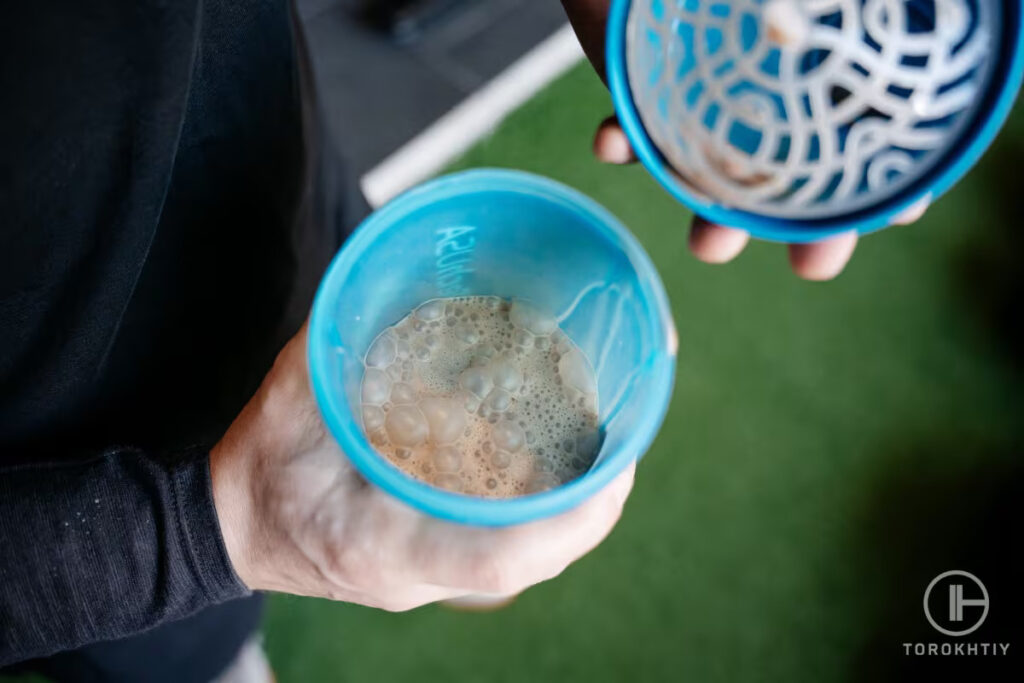
Depending on the methods and stages of filtration, we get a whey protein powder with more or less fats and lactose, as well as a different percentage of protein from the total weight of the product.
As you can see, the production of egg protein vs whey protein is quite different, but overall we get both proteins of very high quality.
2. Average Macro Breakdown (Per Serving)
As for protein from egg whites, the range of macronutrients is very narrow no matter which brand you buy it from. One serving usually contains 23-25 g of protein, 0 grams of fat and 1-2 grams of carbohydrates.
However, some products contain 0.5-1 g of fat per serving and no more than 3 g of carbohydrates. The caloric value of one serving is usually 100-120 kcal.
The situation is slightly different with whey protein, because the range of macronutrients breakdown is wider. One serving can contain 24-30 g of protein, from 0 to 4 g of carbohydrates and from 0 to 3 g of fat. Hence the wider range of calories per serving, which is 90-140 kcal.
The amount of carbohydrates and fats in a serving of whey protein depends on whether the protein went through an additional filtration loop. Whey protein concentrate undergoes the least filtration, therefore it may contain a significant amount of fats and carbohydrates in the form of lactose.
Whey protein isolate goes through additional filtration, which allows to significantly reduce the amount of lactose and / or fat in the final product. It is for this reason that isolates are better suited for people with lactose intolerance.
3. Micronutrients (Per Serving)
If you ever wondered which product looks better in terms of mineral content – egg white protein or whey protein, whey protein looks more attractive.
First, it contains around 100-150 mg of calcium per serving, while egg protein can contain anywhere from zero to about 60 mg (but usually less).
Second, egg protein contains much more sodium – an average of 350-400 mg per serving, compared to an average of 120-250 mg in whey protein. This is something to watch out for, especially if you’re on a low-sodium diet.
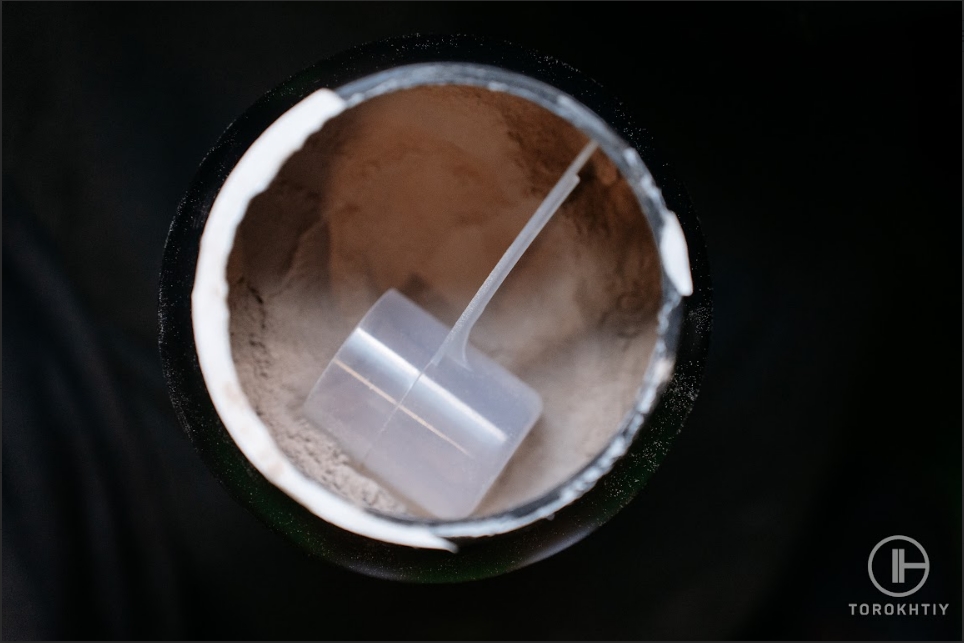
Due to the high sodium content of egg protein powder, I would not recommend using it in large quantities for the average person.
While it may not be a problem for professional athletes who sweat profusely (long-distance runners, cyclists, triathletes, American football players etc.), a large amount of sodium in egg powder may be too much for the average person.
Therefore, if one serving is enough to ease the task of consuming the needed total amount of protein, egg powder may be a good option. However, if you want to get more than 25-30g of protein from a protein supplement consuming 2 servings of 25-30g per day, this may not be the best option due to the high sodium content.
Always keep in mind that the key and primary source of protein should be whole foods, regardless of which product you choose – egg white protein or whey protein. If your protein needs are not very high and you can easily meet them from high-protein whole foods, there is no need to consume multiple servings of protein in supplement form!
The advantage of egg protein is a much higher amount of potassium per serving – 280-400 mg, while whey protein has only 160-250 mg.
See the summary table below:
| Product | Protein | Fats | Carbs | Calories | Calcium | Potassium | Sodium |
|---|---|---|---|---|---|---|---|
| Whey (per ser) | 24-30 g | 0-3 g | 0-4 g | 90-140 kcal | 100-150 mg | 160-250 mg | 120-250 mg |
| Egg (per ser) | 23-25 g | 0-1 g | 1-3 g | 100-120 kcal | 0-60 mg | 280-400 mg | 350-400 mg |
4. Price Range
The cost of one serving of whey protein is ~$1.2-2. Whey protein concentrate is closer to the lower end of this range, while isolate is closer to the upper end.
The average cost of one serving of egg protein is ~$1.9-2. However, below we recommend a great product at $1.55 per serving.
5. Taste and Versatility
Is egg protein better than whey in the context of taste and versatility? In general, egg protein powder has a fairly sharp taste, although this can be subjective and can also depend on the individual product. On the other hand, the taste of whey protein attracts more consumers.

Egg protein powder is best used for omelets or pancakes. It can also be used in baking instead of liquid egg whites. In this context, it has an advantage over pasteurized egg whites in liquid form, because the powder has a much longer shelf life and does not require refrigeration.
If you’re regularly throwing out leftover liquid egg whites because they’ve gone bad (and throwing away the money you spent on them), egg protein powder can be a great alternative.
You can mix protein shake with egg protein, but it is better to combine it with other ingredients to improve the taste, and not just mix it in water. On the other hand, whey protein is more versatile, as it can be used in baking, in pancake mix, as well as in delicious shakes or smoothies.
6. Allergies and Intolerances
Egg powder is a great option for people with allergies to milk proteins, including whey. It is also an excellent source of high-quality protein for people with lactose or milk protein intolerance.
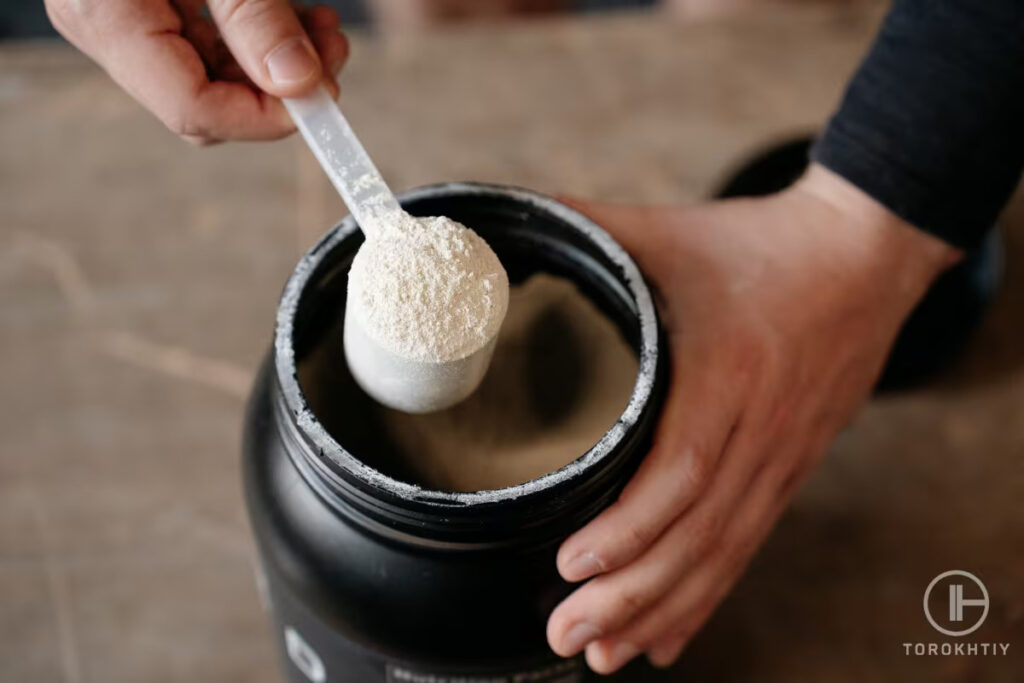
And vice versa, whey protein is suitable for people with an allergy to protein found in eggs, provided there are no problems with lactose and milk protein, of course.
Keep in mind that if you have an allergy to milk proteins, milk-based protein powders and other dairy should be avoided! This also applies to allergies to egg proteins, soy proteins and other products.
Whey vs Egg Protein: Summary
1. Whey Protein
Positives:
Could be better:
2. Egg Protein
Positives:
Could be better:
Egg White Protein Powder vs Whey: When to Use Each
If you are allergic to milk or egg proteins, the choice is obvious. Whey protein is suitable for people allergic to eggs (provided there is no allergy to milk proteins and severe lactose intolerance), and vice versa.
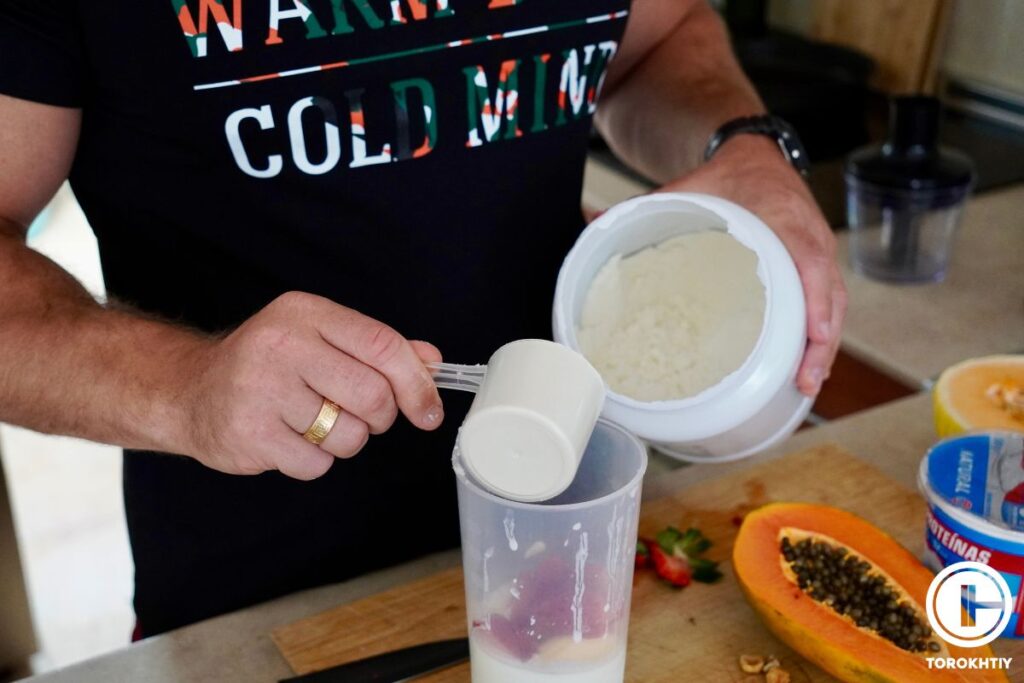
If you are not allergic to either milk or egg proteins, be guided by your taste preferences, gastrointestinal tolerance, and the need for versatility.
In comparing egg white protein vs whey protein for weight loss, egg powder contains less fat and carbohydrates.
This can be taken into account, but ultimately the total calories and protein in your diet are the most important factors in successful weight loss, so either of these types of protein can have a place in your meal plan when you are in a cutting phase.
Overall, if you get sufficient protein from various sources, you should not worry too much about which protein is better – egg white protein powder vs whey.
Products We Recommend
Transparent Labs Grass-Fed Whey Protein
- Serving Size: 32.96g
- Price Per Serving: ~$1.8
- Protein: 28g
- Carbohydrates: 1g (depends on flavor)
- Fat: 0.5g (French Vanilla only)
- Added Sugar: 0g
- Calories Per Serving: 120
- Recommended By Athletes: Hafþór Júlíus Björnsson, Terron Beckham, Paul Sklar
This protein definitely deserves to be at the top of the whey protein rankings. A serving contains 28 g of the highest quality protein, with plenty of BCAA and leucine. Zero to 1 grams of fat, minimal lactose (may be great for those with lactose intolerance), and 8 flavors to choose from.
You can’t ask for better than this whey protein! Despite the relatively high price per serving, it is worth considering that you get not 24-25 g of protein (as in most whey proteins), but 28 g.
Egg White Protein Powder by Naked
- Diet Type (best for): Build muscle, Recovery, Cutting
- Suitable for Vegans: No
- Serving size: 31 g
- Price per serving: ~$1.55
- Protein-by-Weight Ratio (%): 80%
- Protein: 25 g
- Carbohydrates: 2 g
- Fat: 0 g
- Added Sugar: 0 g
- Calories per serving: 110
- Company Founded: 2014
- Recommended by Athletes: Daniel Victor, Hope
If you want to try egg white protein, I don’t see competitors for this product from Naked Nutrition. It contains 25g of easily digestible protein per serving, including more than 2g of leucine.
You will also find 300 mg of potassium and a noticeable amount of calcium. And all this at the price of $1.55 per serving. You won’t find better value for money!
FAQ
Is Egg Protein Better Than Whey?
Both types of proteins hold high positions in terms of amino acid composition and digestibility, and each of them has its own advantages. Choose the supplement that does not cause gastrointestinal problems, tastes good and is more affordable for you.
Can I Replace Whey Protein With Eggs?
Yes, as the whole eggs are an excellent source of high-quality protein. You can also eat both eggs and whey protein on the same day, as long as you don’t have allergies and / or digestive problems after consuming protein powder.
Does Egg Protein Powder Build Muscle?
Absolutely, because it is a source of essential amino acids, including leucine, which our body uses to build muscle mass.
Conclusion
Both types of protein supplements – egg protein vs whey protein – have their own advantages. Whey protein contains more BCAAs and leucine, tastes better (although this is subjective) and is more versatile. On the other hand, egg protein is also high-quality protein, great for baking and can be an alternative for people with milk protein allergies and / or lactose intolerance.
Have you tried both types of these protein supplements? Which do you like more? Let me know in the comments!
Also read:
- Protein vs Amino Acid
- Can You Drink Protein Shakes Without Working Out
- How Often Should You Drink a Protein Shake
- How to Make Protein Shakes Taste Better
- Pre Workout vs Protein Powder
- Should I Drink a Protein Shake After Cardio
- Best Things to Mix Protein Powder With
- Pea Protein vs Whey
- Muscle Recovery Supplements Guide
- Egg White Protein Powder Benefits
- Whey Isolate Protein Guide
References:
- Nutrition Recommendations for Bodybuilders in the Off-Season // National Library of Medicine: https://www.ncbi.nlm.nih.gov/pmc/articles/PMC6680710/
- Milk & Dairy // Allergies: https://acaai.org/allergies/allergic-conditions/food/milk-dairy/
- International Society of Sports Nutrition Position Stand: protein and exercise // Bio Med Central: https://jissn.biomedcentral.com/articles/10.1186/s12970-017-0177-8#Sec17
- Photos made by Torokhtiy Media Team.
Why Trust Us?
With over 20 years in Olympic weightlifting, strength training, nutrition coaching, and general fitness our team does its best to provide the audience with ultimate support and meet the needs and requirements of advanced athletes and professional lifters, as well as people who strive to open new opportunities and develop their physical capabilities with us.
By trusting the recommendations of our certified experts in coaching, nutrition, and sports training programming, as well as scientific consultants, and physiotherapists, we provide you with thorough, well-considered, and scientifically proven content. All the information given in the articles concerning workout programming, separate exercises, and athletic performance, in general, is based on verified data.
The product testing process is described in more detail here.
Author: Oleksandr Maksymenko
Certified Sports Nutritionist,
MSc Sports Dietetics
Specializing in: Weight management, Fitness / Sports nutrition
Oleksandr is a professional fitness nutritionist certified by the Fitness Professional Association (FPA). He follows the principles of evidence-based dietetics and fosters a healthy relationship with food in his clients, ensuring there are no strict prohibitions on their favorite foods or frequent lapses. His primary goal is not only to achieve results for you but also to sustain them over the long term, all while enjoying tasty and delicious food.



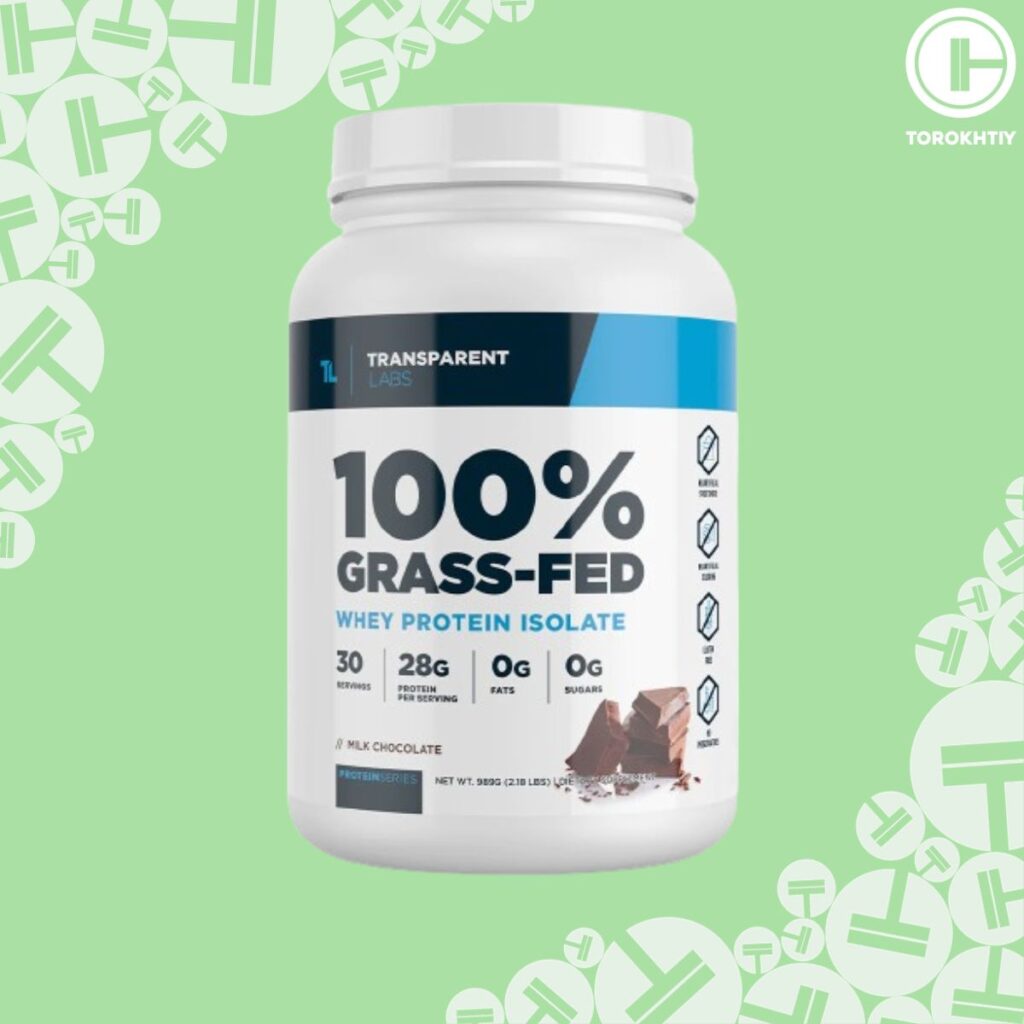
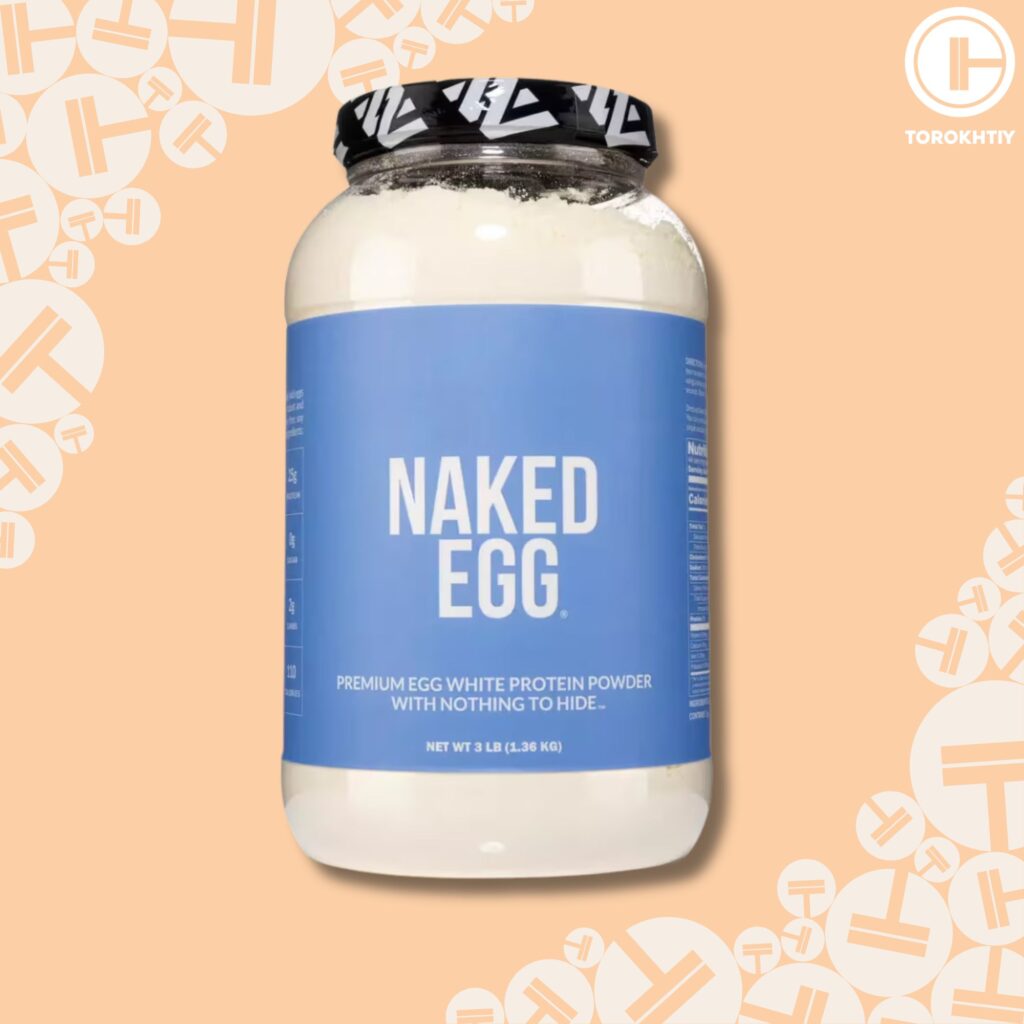
Still have questions after reading our article? Unlock your full potential by engaging with our experts and community! Don’t hesitate — leave a comment below and Oleksandr Maksymenko will provide a personalized answer and insights to help you reach your goals.